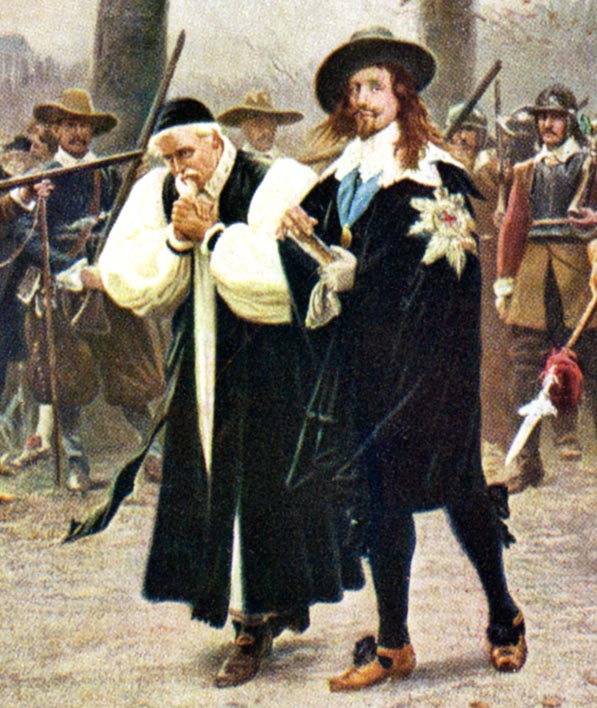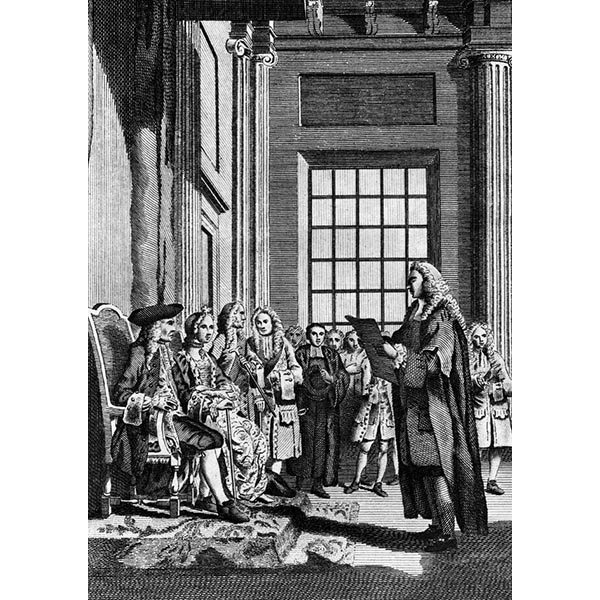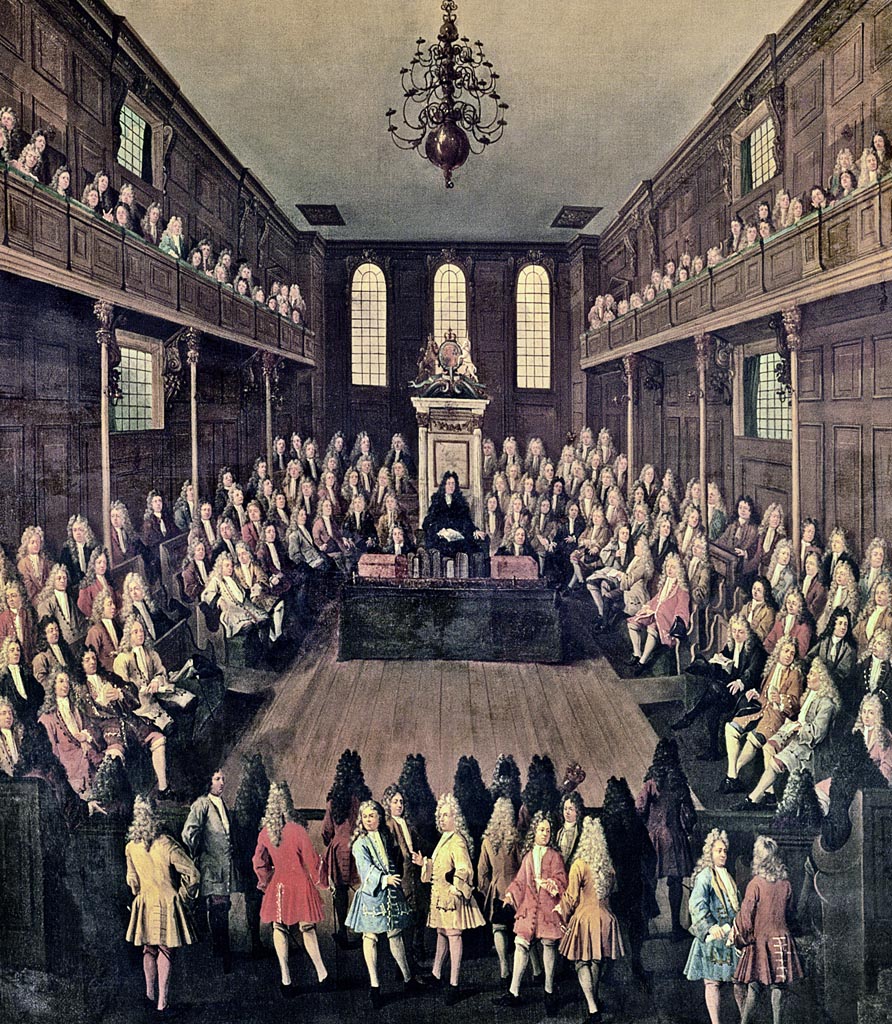
IN CONTEXT
Liberalism
The rule of law
1642 A series of conflicts known as the English Civil War breaks out, due to concerns that Charles I would attempt to introduce absolutism in England.
1661 Louis XIV begins his personal rule of France, and embodies absolutism in the phrase “L’état, c’est moi,” saying that he is the state.
1689 The English Bill of Rights secures the rights of Parliament and elections free of royal interference.
18th century Popular revolutions in France and America lead to the establishment of republics based on liberalist principles.
An important question in political theory concerns the role of government and the functions it should perform. Equally important is the question of what gives the government a right to govern, and where the boundaries of government authority should be. Some medieval scholars argued that kings had a right to rule that had been bestowed upon them by God, while others proclaimed that the nobility had a birthright to rule. Enlightenment thinkers started to challenge these doctrines. But if the power to rule was not to be granted by divine will or by birth, other sources of legitimacy had to be found.
English philosopher John Locke was the first to articulate the liberal principles of government: namely that the purpose of government was to preserve its citizens’ rights to freedom, life, and property, to pursue the public good; and to punish people who violated the rights of others. Lawmaking was therefore the supreme function of government. For Locke, one of the main reasons people would be willing to enter into a social contract and submit to being ruled by a government is that they expect the government to regulate disagreements and conflicts in a neutral manner. Following this logic, Locke was also able to describe the characteristics of an illegitimate government. It followed that a government that did not respect and protect people’s natural rights—or unnecessarily constrained their liberty—was not legitimate. Locke was therefore opposed to absolutist rule. Unlike his contemporary Thomas Hobbes, who believed that an absolute sovereign was required to save people from a brutal “state of nature,” Locke maintained that the powers and functions of government had to be limited.

The centrality of laws
Much of Locke’s writing on political philosophy centered on rights and laws. He defined political power as “a Right of making Laws with Penalties of Death,” He contended that one of the primary reasons why people would voluntarily leave the lawless state of nature was that no independent judges existed in such a situation. It was preferable to grant government a monopoly on violence and sentencing to ensure fair rule of law. Moreover, for Locke, a legitimate government upholds the principle of separation of the legislative and executive powers. The legislative power is superior to the executive—the former has supreme power to establish general rules in the affairs of government, while the latter is only responsible for enforcing the law in specific cases.
"In all the states of created beings capable of law, where there is no law, there is no freedom."
John Locke
One reason for the centrality of laws in Locke’s writings is that laws protect liberty. The purpose of law is not to abolish or restrain, but to preserve and enlarge freedom. In political society, Locke believes that “where there is no law there is no freedom.” Laws, therefore, both constrain and enable freedom. To live in freedom is not to live without laws in the state of nature. Locke points out that “freedom is not, as we are told, liberty for every man to do what he lists (for who could be free when every other man’s humor might domineer over him?), but a liberty to dispose, and order as he lists, his person, actions, possessions, and his whole property, within the allowance of those laws.” In other words, laws can not only preserve, but also enable liberty to be exercised. Without laws, our freedom would be limited by an anarchical, uncertain state of nature, and in practice there may be no freedom at all.

Opposed to absolutist rule, Locke as a child had witnessed the execution of King Charles I in 1649 for being “a tyrant, traitor, murderer, and public enemy to the good of this nation.”
Man’s initial condition
Locke says that laws should be designed—and enforced—with man’s initial condition and nature in mind. Like most social contract theorists, he considers men to be equal, free, and independent. According to Locke, the state of nature is a situation in which people coexist, often in relative harmony, but there is no legitimate political power or judge to settle disputes in a neutral way. Locke writes that “men living according to reason, without a common superior on Earth to judge between them, is properly the state of nature.”
Unlike Hobbes, Locke does not equate the state of nature with war. A state of war is a situation in which people do not uphold natural law, or the law of reason as Locke calls it. Where Hobbes would see human beings acting as “power maximizers,” mainly concerned with self-preservation, Locke finds that people can act according to reason and with tolerance in the state of nature. Conflicts are therefore not necessarily common in a state of nature. However, when population density increases, resources become scarce, and the introduction of money leads to economic inequality, conflicts increase, and human society begins to need laws, regulators, and judges to settle disputes in an objective manner.

The purpose of government
The question of legitimacy was at the heart of Locke’s political thinking. Following the example of Hobbes, he sought to deduce the legitimate role of government, based on an understanding of the human state of nature.
Locke agrees with Hobbes that a legitimate government is based on a social contract between individuals in a society. The problem with the state of nature is that there are no judges or police to enforce the law. People are willing to enter civil society in order for government to take up this role. This is, therefore, a legitimate role for government. Another important aspect of legitimate government is rule by consent of the people. For Locke, this did not have to mean democracy—a majority of people could reasonably decide that a monarch, aristocracy, or a democratic assembly should rule. The important point was that the people granted the right to rule, and were entitled to take back this privilege.
Locke argued against a strong, absolutist sovereign—as advocated by Thomas Hobbes—since such a powerful figure would limit individual freedom unnecessarily. For Locke, total subordination was dangerous. He wrote: “I have reason to conclude that he who would get me into his power without my consent would use me as he pleased when he got me there, and destroy me too when he had a fancy to it; for nobody can desire to have me in his absolute power unless it be to compel me by force to that which is against the right of my freedom, i.e., make me a slave.”
Rather, Locke favors a limited role for government. Government should protect people’s private property, keep the peace, secure public commodities for the whole people, and as far as possible, protect citizens against foreign invasions. For Locke, “This is the original, this is the use, and these are the bounds of the legislative (which is the supreme) power in every commonwealth.” The purpose of government is to do what is missing in the state of nature to ensure people’s freedom and prosperity. There is no need to enslave people under absolute rule. The primary function of government is to craft good laws to protect people’s rights, and to enforce those laws with the public good in mind.

The English Bill of Rights, ratified by King William III in 1689, established limits on the king’s power, conforming with Locke’s contention that a monarch only rules by the consent of the people.
The right to revolt
Locke’s distinction between legitimate and illegitimate governments also carries with it the idea that opposition to illegitimate rule is acceptable. Locke describes a range of scenarios in which people would have a right to revolt in order to take back the power they had given the government. For example, people can legitimately rebel if: elected representatives of the people are prevented from assembly; foreign powers are bestowed with authority over people; the election system or procedures are changed without public consent; the rule of law is not upheld; or the government seeks to deprive people of their rights. Locke regarded illegitimate rule as tantamount to slavery. He even went as far as to condone regicide—the execution of a monarch—in circumstances where the monarch has broken the social contract with his people. As the son of Puritans who had supported the Parliamentarian cause in the English Civil War, this was no mere theoretical concern—Locke’s writing gives a clear justification for the execution of Charles I.

For a government to be legitimate, according to Locke, assemblies of elected representatives of the people, such as the House of Commons, must be allowed to meet and debate.
Locke’s legacy
The political philosophy of John Locke has, since his time, become known as “liberalism”—the belief in the principles of liberty and equality. The revolutions in France and North America near the end of the 18th century were founded on liberal ideas. In fact, Thomas Jefferson, one of the architects of the American Constitution and the Declaration of Independence, revered Locke, and used many of his phrases in the founding documents. The emphasis on protection of “life, liberty, or property” found in the Bill of Rights in the Constitution, and the inalienable rights to “Life, Liberty, and the pursuit of Happiness” in the Declaration can all be traced directly back to John Locke’s philosophy a century earlier.
"A Bill of Rights is what the people are entitled to against every government, and what no just government should refuse, or rest on inference."
Thomas Jefferson
JOHN LOCKE

John Locke lived in—and shaped—one of the most transformative centuries in English history. A series of civil wars pitted Protestants, Anglicans, and Catholics against each other, and power vacillated between the king and the Parliament. Locke was born in 1632 close to Bristol, England. He lived in exile in France and Holland for large periods of time due to suspicions that he was involved in an assassination plot against King Charles II. His book Two Treatises of Government provided the intellectual foundation for the Glorious Revolution of 1688, which transferred the balance of power permanently from the king to Parliament. He promoted the idea that people are not born with innate ideas, but with a mind like a blank slate—a very modern way of viewing the self.
Key works
1689 Two Treatises of Government
1689 A Letter Concerning Toleration
1690 An Essay Concerning Human Understanding
See also: Thomas Hobbes • Montesquieu • Jean-Jacques Rousseau • Thomas Jefferson • Robert Nozick
